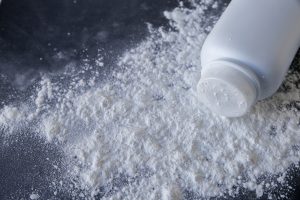
Recently, a jury found Johnson & Johnson guilty and ordered the company to pay $127 million in compensatory damages to patients in a class action lawsuit. To many, this verdict is frightening because it involved a product that parents and others have used daily: Talcum powder. Many have been left wondering if the verdict is irrevocable proof that the use of talcum powder leads to cancer.
While talcum powder and its link to cancer has made big news in recent months, the true story is a bit more complex than the media is letting on.
History of the Product
More than a century ago, Dr. Frederick B. Kilmer invented scented powder. The powder was labeled for “toilet and nursery” use. The doctor had the idea to add scent to talcum powder and market it with sanitary napkins for use by midwives and mothers immediately following childbirth. The powder became so popular that many began to associate its smell with newborns themselves.
Fast forward today, and talcum powder can be found in a wide range of products. It is used to absorb moisture and odor. In some products, it is used to reduce friction. It was later found that talcum powder is not as safe as was once thought.
History of Lawsuits
The first lawsuit regarding talcum powder was filed in 2009. A woman in South Dakota was diagnosed with ovarian cancer at the age of 49. She claimed to have used talcum powder in her underwear for most of her life. She sued Johnson & Johnson and was offered a settlement. Part of the settlement offer was a confidentiality clause. The woman refused to sign and ultimately received no monetary award. The jury, however, did find a direct link between talcum powder and cancer.
In the most recent suit, the jury found that Johnson & Johnson knew of the risks of talcum powder and decided not to inform the public. Denying the possible risks associated with using the product could “damage the company’s own image,” according to an internal memo submitted as evidence.
So far there is no scientific proof that talcum powder heightens the risk of cancer in its users. Because talc is not considered a drug, there has been very little research, if any, to its potential medical risks. Because no scientific proof has been offered, consumers are advised to use the product at their own risk.
The American Cancer Society suggests that anyone fearful of the continued use of talcum powder switch to a cornstarch-based powder. These products are known to be safe.
If you believe that you have been sickened by a product, you may have grounds for a product liability lawsuit. You may receive compensation for medical bills, lost wages and more. Reach out to our office today and schedule an appointment for a free case evaluation. We will advise you of your options and help you move forward if you choose to do so. Call now or browse our website for more information about our firm and the types of cases we handle.